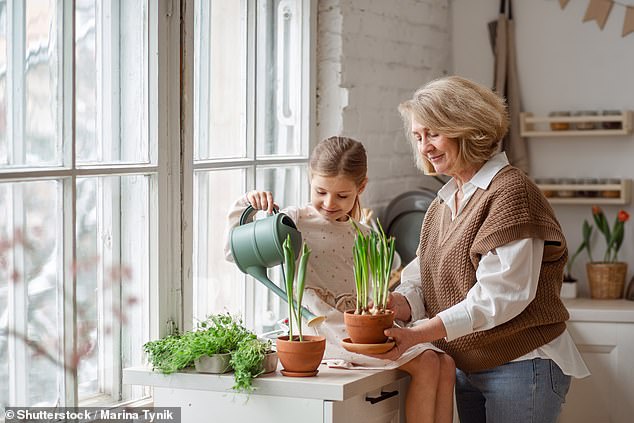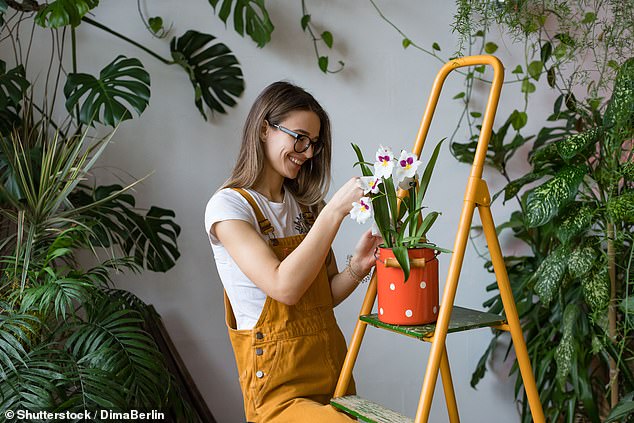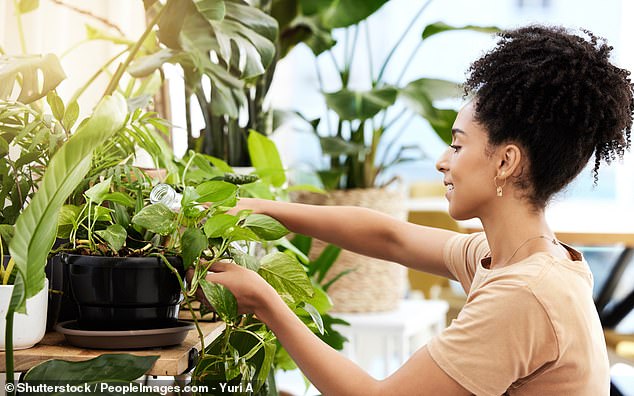One in seven people has a ‘strongly connected’ relationship with a houseplant, research shows
Houseplants used to be something that people simply thought they needed to water, but now they are considered “family members.”
As many as one in seven people have a ‘very connected’ relationship with their potted plants, research shows.
It means that they have a ‘deep love’ for the plants that share their home, or even see them as part of the family.
The findings come from an academic survey of 115 houseplant owners, including Swiss cheese plants, heart-shaped Devil’s Ivy and cacti.
The study volunteers, aged 18 to 69, were asked to “describe your relationship with your houseplants.”
Comments on the survey, conducted in Australia, included a 28-year-old man telling researchers that his plants are “just like my children” and a woman saying, “I often water them and care for them like family members.”
The research found that 14 percent of people had a “very connected” relationship with their houseplants, while 42 percent were “emotionally attached.”
Like King Charles, a 48-year-old man confessed that he spoke to his plants every day because of his love for them.
Houseplants used to be something people just thought they needed to water, but now they’re considered ‘family members’ (stock image)

As many as one in seven people have a ‘strongly connected’ relationship with their potted plants, a study shows (stock image)
A 27-year-old woman said, “Who needs children when you have plants?”
It comes amid a social media craze for posing with elaborate potted plants, sales of which soared during Covid and beyond.
Dr. Brianna LeBusque, who led the houseplant study, published in the journal Plant Environment Interactions, said: ‘Many people are known to think of their pets as their children, but houseplants now seem to be like family members too.
‘People have intense feelings for their potted plants, perhaps because caring for them provides a real sense of purpose and satisfaction.
‘A generation ago, houseplants were more like furniture: decorative, but not much more.
‘Now people seem to be really researching the care of their plants and knowing their precise scientific names, with some people telling us they really suffer emotionally when a plant loses a leaf or starts to wilt.’
On average, people surveyed, recruited through posters and social media, had 15 houseplants, but one person had more than 500.
Interestingly, men were probably among the 12 percent of people who said they had “no relationship” with their plants.

It means they have a ‘deep love’ for the plants that share their home, or even see them as part of the family (stock image)

The findings come from an academic survey of 115 houseplant owners, including Swiss cheese plants, heart-shaped devil’s ivy and cacti (stock image)
Women made up a higher proportion of those in a strongly connected relationship.
Among them was a 21-year-old woman who said, “I cried because the leaf of my plant broke off today, so you could say I’m quite attached to her.”
It follows studies showing that houseplants reduce stress and negative emotions, while inducing feelings of relaxation when placed in offices.
When asked what benefits they experience from having houseplants, half of people in the current research project said plants are beautiful to look at or improve rooms, while almost a third mentioned the beneficial effects of plants on indoor air quality .
The study was conducted during the Covid pandemic, but researchers say houseplants continue to occupy people’s hearts.
This seems to be especially true among Gen Z, with a 24-year-old woman saying her plants “almost made her feel like they were my pets,” while a 26-year-old said, “They’re my babies.”
Tijana Blanusa, Principal Horticultural Scientist at the Royal Horticultural Society, said: ‘This Australian research highlights the different levels of involvement people have with their houseplants, showing that owners value the aesthetic and calming role of plants.’ Recent RHS-supported research highlighted people’s preferences for rounded plant contours and the importance of a healthy plant appearance to reap those wellbeing benefits.”
